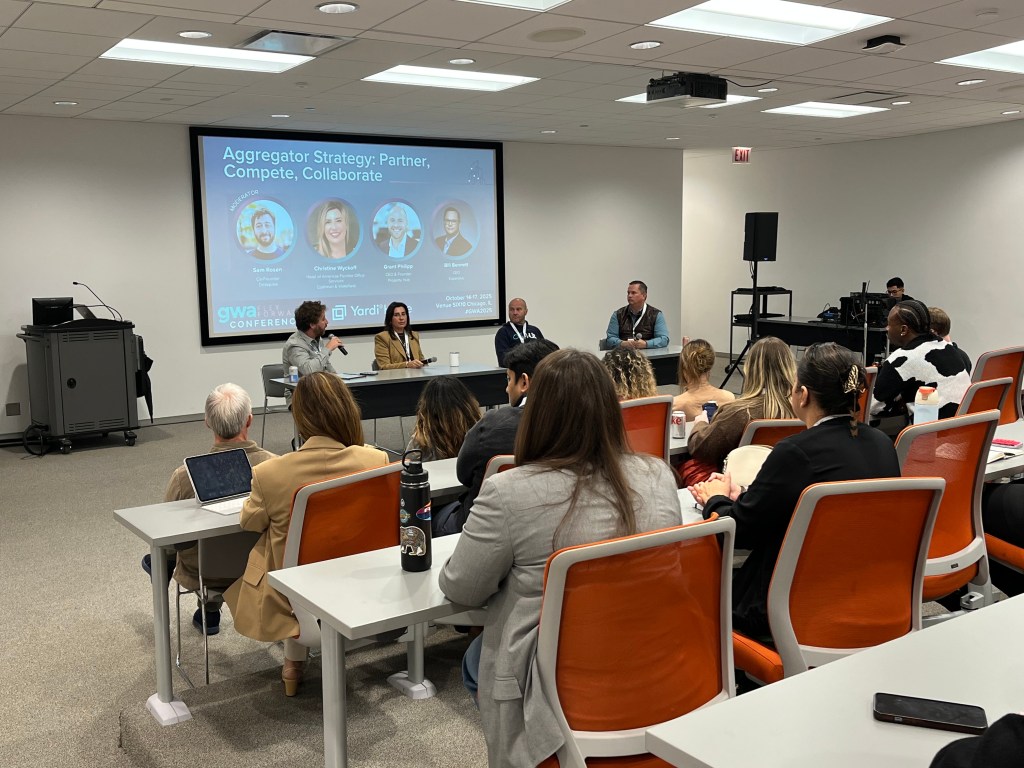Brokers, Not Just Marketplaces: The Real Aggregator Strategy for Coworking Growth
Hosted by Sam Rosen of Deskpass at the 2025 GWA Conference in Chicago, the “Aggregator Strategy” panel was supposed to unpack how marketplaces can drive coworking leads. Instead, it evolved into a candid, high-energy conversation about something more powerful, and more misunderstood, than aggregators: brokers. Panelists Christine Wyckoff (Cushman & Wakefield), Grant Phillip (Office Hub) and Bill Bennett (Expansive) brought together the perspectives of brokerage, aggregator and operator. Their discussion revealed one key message for coworking operators: if you want to grow, learn how to work with brokers and embrace aggregator strategies that actually drive results.
The Broker Advantage: Faster, Smarter and Data-Driven
Christine Wyckoff has spent decades on both sides of the flex office industry, first as an operator, now leading Cushman & Wakefield’s Americas Flexible Office Services. She made a strong case for why operators should partner closely with brokers instead of treating them as competitors. Her secret weapon? Grant’s platform, Office Hub, aggregates data from over 35,000 coworking locations worldwide. “I can answer a client’s question in real time, zip code, amenities, pricing, availability and turn it into a customized PDF instantly,” she explained. “That kind of speed and accuracy wins deals.”
The takeaway: data transparency is the currency of broker success. When operators provide up-to-date details, like ballpark pricing, amenities and neighborhood insights, they dramatically increase their chances of being shortlisted by major brokerage firms serving global clients.

Aggregators vs. Brokers: Know the Difference
Grant Phillip, founder of Office Hub, clarified a major industry misconception: not all aggregators are created equal. “There are marketplaces that just farm leads and do nothing with them,” he said. “Then there are tenant advisors for flex, true brokers, who chase the deal, nurture the lead and make sure it converts.” He cautioned operators to be selective about who they partner with. “Test the waters. Make an inquiry on their site and see if it comes back to you,” he said. “Align with brokers who actually add value.”
Phillip also shared a surprising stat: in leading flex markets like the UK and India, up to 80% of leads come through brokers. Operators there treat brokers as an extension of their marketing, “their sales force”, instead of a necessary evil. The result? Consistent occupancy and growth. “Embrace the broker,” Phillip urged. “If you work well with them, you’ll grow your bottom line. If you don’t, you’re betting your business on SEO, and SEO is dying.”
The SEO Shift and AI Reality
Bill Bennett, CEO of Expansive, agreed that the old marketing playbook is fading fast. “SEO has worked less well every month for the last seven years,” he said. “It’s about to collapse.” Why? AI. “Inference models like ChatGPT are changing how consumers search,” Bennett explained. “They don’t follow SEO rules – they think like people.”
That’s both a challenge and an opportunity. Operators and aggregators who adapt to AI-driven discovery can get ahead, but it means shifting focus from keywords to real-time data accuracy, responsiveness and customer experience.
Bennett’s top advice:
- Respond fast. Your response time determines your conversion rate.
- Pay brokers promptly. Fast payments win loyalty and referrals.
- Hire local business developers. Human connection still drives the best deals.

Collaboration, Not Competition
A unifying theme emerged from the panel: the industry grows when operators, brokers and aggregators collaborate. Wyckoff urged operators to let brokers pull verified data directly from aggregator platforms instead of filling out endless benchmarking forms. “That’s how we eliminate noise and focus on deals that convert,” she said.
And while Phillip championed the power of brokers, Bennett and Wyckoff both noted the need for differentiation. As coworking matures and becomes more commoditized, operators must define what makes them unique, whether it’s community, design, enterprise flexibility or technology. “Your value proposition matters more than ever,” Wyckoff said. “Every space has its story. Tell it clearly, and you’ll win.”
Actionable Aggregator Strategies for Operators
To wrap it up, here are five takeaways from the panel that coworking operators can act on now:
- Feed the brokers. Keep your location data, amenities and pricing current on trusted aggregator platforms.
- Respond immediately. Speed equals sales. Assign someone (or something) to respond to every broker or lead within minutes.
- Collaborate on data. Let brokers access your verified listings via APIs or shared platforms as they’ll bring you more qualified leads.
- Define your differentiation. As flex becomes commoditized, stand out through service, experience or niche focus.
- Play the long game. Build relationships with brokers and aggregators that add value – those who chase leads, not just list them.
“Don’t worry so much about your slice,” Rosen concluded. “Work on making the pie bigger.” For operators, that means seeing brokers and aggregators not as competitors, but as partners in a shared mission: to grow the flex industry together.
